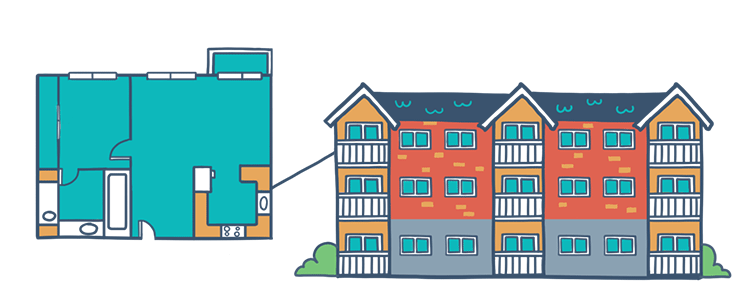FHA Condominium Loan

Condominium ownership is a non-conventional form of homeowning that is becoming more and more popular. Condominiums, or condos, are developments in which separate owners of individual units mutually own the common areas and facilities (such as pools and clubhouses). In an effort to encourage more Americans to take part in the housing market, the FHA insures condominium loans under Section 234(c) and encourages lenders to finance these purchases. Having these loans backed by the FHA is very important for low- and moderate-income renters who wish to avoid the risk of being displaced when their apartments are converted into condominiums.
Property Eligibility
Under the Section 234(c) program, the FHA insures a 30-year loan to purchase a unit in a condominium building. The building must contain at least four dwelling units and can be comprised of detached and semidetached units, row houses, walkups, or an elevator structure. The units must be used for residential purposes, not investment or business related. The development must also be "FHA-approved."
For a condominium project to be approved for an FHA-insured home loan, "the project must have been declared and exists in full compliance with applicable State law requirements of the jurisdiction in which the condominium project is located and with all other applicable laws and regulations."
If it is not an FHA-approved condominium project, it must be a project that meets the Single-Unit Approval requirements. The condominium project must also meet the requirements established by HUD through the SF Handbook 4000.1, including insurance coverage, financial condition, nature of title, the existence of any pending legal action or physical property condition, and other factors that may affect the viability or marketability of the project or its units.
If you are interested in purchasing a condo, the FHA updates its approved list of condominium projects regularly.

FHA Loan Articles
April 3, 2021Borrowers can choose to refinance for several reasons, but it comes down to prioritizing different benefits. One homeowner may want the lowest possible monthly payment, while another might want the shortest possible term for their loan.
March 24, 2021One of the major arguments people have for renting instead of buying is the large upfront cost of a down payment. Depending on the type of loan program you apply and are approved for, this could mean anything between 3.5% and 20% percent of your purchase price.
March 21, 2021The two basic types of home loans are fixed rate and adjustable-rate mortgages. The mortgage market offers many other options to homebuyers, but these two are the most common, and the first pair from which to pick.
March 15, 2021A key step in the mortgage process is the home appraisal. In the case of home purchase or refinance, this is a task that is almost always required by the lender, and it is important that potential homebuyers understand what, how, and why of a home appraisal.
March 10, 2021The renewable energy industry is growing more and more every year, and many homeowners have implemented energy-efficient strategies in their homes. This can include programmable thermostats, solar panels, new insulation in the attic, etc.
March 6, 2021When buying a home, you have a list of things you need to do. Get pre-approved, arrange for a home inspection, and a few other tasks. One important thing on that list is shopping for homeowner’s insurance.








